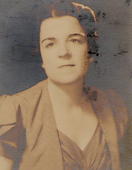BETA PI THETA by Dr. Scott Fish

Elizabeth "Bessie" Louise Standifer Hall Rogers, circa 1950, Courtesy of Dr. Ward Oliver.

Miss Sarah Rogers, 1928 Executive Secretary of Beta Pi Theta and faculty advisor to chapter Theta Zeta. Courtesy of Coker College.




Beta Pi Theta was a French honorary founded in the city of Birmingham, Alabama by Elizabeth "Bessie" Louise Standifer (1900-1966). Born in Eufaula, Alabama, Standifer graduated from the University of Alabama with honors. While an undergraduate, Standifer was a standout student. She was the first female co-editor of the university yearbook, the Corolla, and was a member, leader and founder of many university honor societies, clubs and organizations; she was especially active in literary societies. Following graduation, she taught mathematics and chemistry at Phillips high school in Birmingham, Alabama, and her biographic profile in Thompson's History of Barbour County, Alabama indicates that she took additional coursework at Howard College. It is thus likely during this period in 1924 that she founded Beta Pi Theta, although the reasons for the foundation of a French literary society are still unknown. Aside from the first chapter, Alpha, all of Beta Pi Theta's chapters include a two Greek-letter combination starting with Theta. Standifer served as the Executive Secretary of the Society from 1927-1928. (2)
Purpose
"BETA PI THETA is an honorary fraternity established with the purpose of organizing representative men and women in universities and colleges who by travel, study, conversation, interest, influence, and ability will advance the progress of literary French and things cultural in America; who will maintain the highest scholarship and literary standards; who will encourage consecration to social service and the highest ideals of a liberal education, and who will recognize and award merit in productive French literature." ("Beta Pi Theta." Baird's Manual of American College Fraternities. Ed. Francis W. Shepardson. Vol 11 (Menasha, Wisconsin: Georges Banta Publishing Co., 1927) 373.
Emblems
The Beta Pi Theta badge is a hexagon with concave sides displays the Society's Greek letters. A Greek lamp appears above the letters while a scroll appears beneath them. the Beta Pi Theta key is rectangular and on one side bears the Beta Pi Theta coat-of-arms and on the other the Society's three Greek letters. The pledge button is an unmounted Beta Pi Theta coat-of-arms. The Society's colors are purple, gold and while, and the flower is the lily.
Publications
Trademarks were filed on March 23 and April 10, 1928 with the United States Patent Office by Executive Secretary Sarah Rogers of Coker College for Women (Hartsville, South Carolina) for the Society's quarterly newsletter What's Doing in Beta Pi Theta and its combination of Greek letters: ΒΠΘ. Sarah was a 1914 graduate of Coker College for Women (later Coker College) and taught French in Mississippi before working at Coker. The Society's other publication was Beta Pi Theta Quarterly News Letter.
Chapters & Dissolution
By 1935 Beta Pi Theta boasted thirty-five chapters in the United States while Pi Delta Phi had only eight. The Society held a national essay contest and awarded a scholarship to attend the summer French language school at Middlebury College in Vermont. The organization was, perhaps like other academic societies, mostly inactive during WWII and attempted to reactivate after the war. For reasons unknown, the society had ceased to function nationally by 1948. A few individual orphaned chapters operated independently, however, until 1960. Pi Delta Phi contacted many of the orphaned chapters in the 1950s and 60s and invited them to apply for affiliation.
institution, location, installation date, chapter Greek letters
City of Birmingham, Alpha
Adrian College, Adrian, Michigan, 1926, Theta Beta
Baker University, Baldwin City, Kansas, Theta Epsilon
Baldwin Wallace University, Berea, Ohio
Baylor College for Women, Belton, Texas, 1931, Pi Eta
Baylor University, Waco, Texas, 1927, Theta Chi
Bowling Green State University, Bowling Green, Ohio, 1936, Pi Xi
Butler University, Indianapolis, Indiana
Coker College, Hartsville South Carolina, Theta Zeta
Dakota Weslayan University, Mitchell South Dakota, 1930, Pi Epsilon
Eureka College, Eureka, Illinois, 1926, Theta Delta
Florida State College for Women, Tallahassee, Florida, 1926, Theta Kappa
Gordon College, Barnesville, Georgia, Theta Lambda
Knox College, Galesburg, Illinois, Pi Delta
Howard College (now Samford University), Birmingham Alabama, 1926, Theta Nu
Iowa Wesleyan College, Mt. Pleasant, Iowa, Theta Gamma
Lawrence University, Appleton, Wisconsin, Theta Iota
Lindenwood College, St. Charles, Missouri, Theta Xi
Longwood University, Farmville, Virginia, 1930, Pi Zeta
McKendree University, Lebanon, Illinois, 1936, Pi Sigma
Miami University, Oxford, Ohio, 1929, Pi Gamma
Mississippi State University, Starkville, Mississippi
Mount Union College, Alliance Ohio, 1937, Theta Omicron
Murray State University, Murray, Kentucky, 1937
Nebraska Wesleyan University, Lincoln, Nebraska, Theta Pi
Queens College, Charlotte, North Carolina, 1926, Theta Mu
Park College, Parkville, Missouri, 1926, Theta Eta
Rutgers University, New Brunswick, New Jersey
St. Lawrence University, Canton, New York, 1928, Theta Iota
Shorter College, Roma, Georgia, Theta Theta
Southern Methodist University, Dallas, Texas, 1927, Theta Phi
University of Alabama, Tuscaloosa, Alabama
University of Chattanooga, Chattanooga, Tennessee, Theta Sigma
University of Nebraska, Kearney, Nebraska, 1930, Pi Iota
University of Maine, Orono, Maine, 1928, Theta Tau
University of Maryland, College Park, Maryland, 1929, Pi Beta
University of South Carolina, Columbia, South Carolina, Pi Nu
University of Tennessee, Chattanooga, Chattanooga Tennessee, 1930, Theta Sigma
West Virginia University, Morgantown, West Virginia, 1927, Theta Upsilon
Winthrop College, Rock Hill, South Carolina, 1930, Theta Omega
Wofford College, Spartanburg, South Carolina, Theta Rho
(1) The Student Association of Southern Methodist University, The Rotunda (Dallas: South Methodist U, 1928) 267.
(2) Mattie Crocker Thomas Thompson, History of Barbour County (Alabama. Eufaula, AL: N.p., 1939) 125-127.

